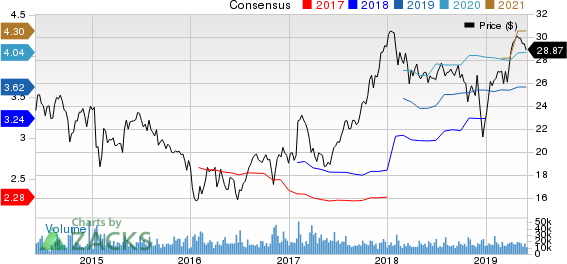Value investing is easily one of the most popular ways to find great stocks in any market environment. After all, who wouldn’t want to find stocks that are either flying under the radar and are compelling buys, or offer up tantalizing discounts when compared to fair value?
One way to find these companies is by looking at several key metrics and financial ratios, many of which are crucial in the value stock selection process. Let’s put Ally Financial Inc. (NYSE:ALLY) stock into this equation and find out if it is a good choice for value-oriented investors right now, or if investors subscribing to this methodology should look elsewhere for top picks:
PE Ratio
A key metric that value investors always look at is the Price to Earnings Ratio, or PE for short. This shows us how much investors are willing to pay for each dollar of earnings in a given stock, and is easily one of the most popular financial ratios in the world. The best use of the PE ratio is to compare the stock’s current PE ratio with: a) where this ratio has been in the past; b) how it compares to the average for the industry/sector; and c) how it compares to the market as a whole.
On this front, Ally Financial has a trailing twelve months PE ratio of 8.34, as you can see in the chart below:
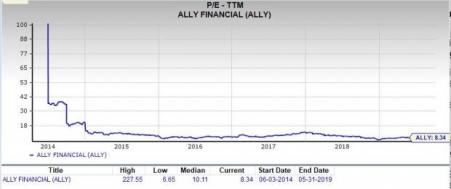
This level actually compares pretty favorably with the market at large, as the PE for the S&P 500 stands at about 17.11. If we focus on the long-term PE trend, Ally Financial’s current PE level puts it below its midpoint over the past five years.
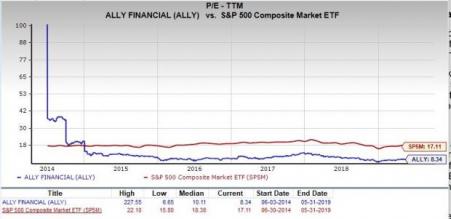
Further, the stock’s PE compares favorably with the Zacks Finance sector’s trailing twelve months PE ratio, which stands at 13.75. At the very least, this indicates that the stock is relatively undervalued right now, compared to its peers.
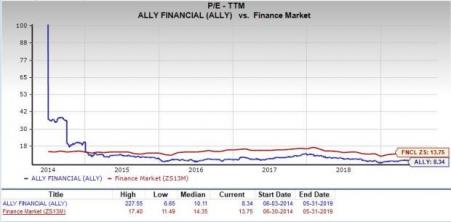
We should also point out that Ally Financial has a forward PE ratio (price relative to this year’s earnings) of just 7.97, so it is fair to say that a slightly more value-oriented path may be ahead for Ally Financial stock in the near term too.
P/S Ratio
Another key metric to note is the Price/Sales ratio. This approach compares a given stock’s price to its total sales, where a lower reading is generally considered better. Some people like this metric more than other value-focused ones because it looks at sales, something that is far harder to manipulate with accounting tricks than earnings.
Right now, Ally Financial has a P/S ratio of about 1.95. This is lower than the S&P 500 average, which comes in at 3.07 right now. Also, as we can see in the chart below, this is below the highs for this stock in particular over the past few years.
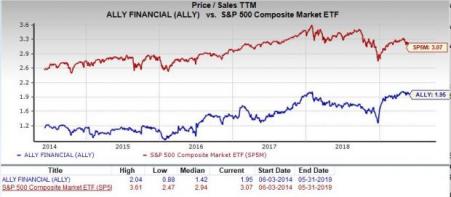
If anything, ALLY is near the higher end of its range in the time period from a P/S metric, suggesting some level of overvalued trading—at least compared to historical norms.
Broad Value Outlook
In aggregate, Ally Financial currently has a Value Score of A, putting it into the top 20% of all stocks we cover from this look. This makes Ally Financial a solid choice for value investors, and some of its other key metrics make this pretty clear too.
For example, the PEG ratio for Ally Financial is just 0.57, a level that is bit lower than the industry average of 0.84. The PEG ratio is a modified PE ratio that takes into account the stock’s earnings growth rate. Additionally, the P/CF ratio for Ally Financial came in at 3.92, which is a far lower than the industry average of 6.14. Clearly, ALLY is a solid choice on the value front from multiple angles.
What About the Stock Overall?
Though Ally Financial might be a good choice for value investors, there are plenty of other factors to consider before investing in this name. In particular, it is worth noting that the company has a Growth Score of D and a Momentum Score of D. This gives ALLY a Zacks VGM score — or its overarching fundamental grade — of B. (You can read more about the Zacks Style Scores here >>)
Meanwhile, the company’s recent earnings estimates have been encouraging. The current year has seen five estimates go higher in the past sixty days compared to no movement in the opposite direction, while the full year 2020 estimate has seen five upward revision compared to no downward in the same time period.
This has had a positive impact on the consensus estimate though as the current year consensus estimate has increased by 1.1% in the past two months, while the full year 2020 estimate has risen by 2%. You can see the consensus estimate trend and recent price action for the stock in the chart below:
This bullish trend is why the stock boasts a Zacks Rank #2 (Buy) and why we are expecting outperformance from the company in the near term.
Bottom Line
Ally Financial is an inspired choice for value investors, as it is hard to beat its incredible line up of statistics on this front. A strong industry rank (among top 7% of more than 250 industries) and a Zacks Rank #2 further instils our confidence.
However, over the past two years, the Zacks Financial – Consumer Loans industry has clearly underperformed the market at large, as you can see below:
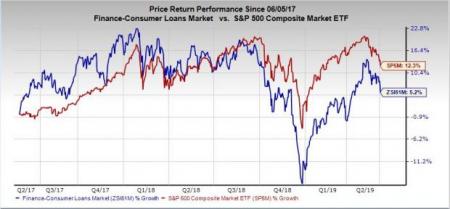
So, value investors might want to wait for industry trends to turn favorable in this name first, but once that happens, this stock could be a compelling pick.
Will you retire a millionaire?
One out of every six people retires a multimillionaire. Get smart tips you can do today to become one of them in a new Special Report, “7 Things You Can Do Now to Retire a Multimillionaire.”
Click to get it free >>
Ally Financial Inc. (ALLY): Free Stock Analysis Report
Original post
Zacks Investment Research

